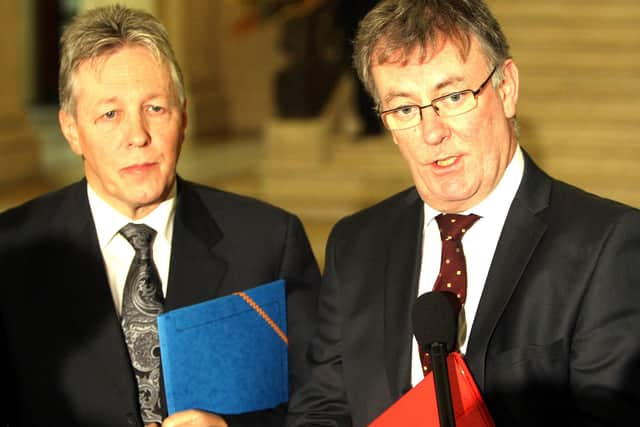Alex Kane: The centenary of NI needs a coherent, united pro-Union message


That was something that couldn’t be taken for granted 100 years ago. Yet for all the hoopla underpinning Sinn Fein’s our-day-will-come project (which, in its latest manifestation, kicked off about the same time as the Decades of Centenaries programme in 2012) their so-called ‘inevitable’ unity cannot be taken for granted. Likewise, Micheál Martin’s ‘beefed-up’ Shared Island Unit may have irked unionism a couple of weeks ago, but even he would admit that there is nothing inevitable about a united Ireland.
But regular readers will know that I’m a be-ready-for-all-outcomes-and-possibilities kind of guy. I’ve said many, many times that I’m an unambiguous, unapologetic unionist and I can conceive of no circumstance in which I would swap my citizenship of the United Kingdom for citizenship of a united Ireland. That said, I’m not afraid of a debate on the subject and I have no objection to any party which wants to make the case for unity by entirely democratic means.
Advertisement
Hide AdAdvertisement
Hide AdI’m aware there are unionists who believe taking part in the debate risks conveying the impression you think unity has become a serious possibility. Yet in not taking part – or failing to even make your own case from a separate platform – there’s also the risk of allowing your political opponents to gain traction. The problem, as we now know, is that once that happens it becomes very difficult to catch-up with your own counter-message and narrative, let alone gain an edge and take the lead in terms of input and impact.


I noted in the column a couple of weeks ago that John Hume had more specific, lasting influence on successive UK governments than had any unionist equivalent. That’s because he took his case – at a time when people were barely even listening to local nationalism, because the electoral gap between unionism and non-unionism was so wide – to anyone and everyone who would open a door and incline an ear in London, Dublin, Washington or Brussels (or anywhere else for that matter). That’s why so much of what used to be mocked by unionists as ‘Hume-speak’ found its way into government policy and subsequent political initiatives.
With Northern Ireland’s centenary just around the corner (which is one of the reasons Boris Johnson popped across from his Scottish cliff-top holiday tent last week, to tell us about his Centenary Forum and Centenary Historical Advisory Panel) there are a number of issues for unionists to consider. A centenary celebration will, by its very nature, focus attention on the past; but it also involves surveying the present (to the extent of understanding how it differs from the past) and preparing for the future.
In terms of the challenges unionists face, here are a number off the top of my head. The clash between the competing nationalisms across the United Kingdom; the surge, influence and interests of a rebooted English nationalism (the like of which I haven’t seen in my lifetime); the rise of Scottish nationalism and Sinn Fein; the combined impact of finally leaving the EU without a deal and the massive economic hit the UK has already taken from the pandemic; the closing electoral gap between unionism and nationalism in Northern Ireland; the rise of what can best be described as the ‘other’ demographic in Northern Ireland and how it can be kept within the pro-UK camp; the outcome of an independence referendum in Scotland (which I think is more likely than not); and, of course, the looming shadow of a border poll (and while we can argue over dates, I still think it’s inevitable).
Advertisement
Hide AdAdvertisement
Hide AdIn September 2012, at a dinner celebrating the centenary of the Ulster Covenant, Peter Robinson spoke about creating a Council for the Union to prepare for the 2021 celebrations. Now, unless it is meeting and preparing and planning well below the radar I’m not aware of anything on the scale of which he was talking. And while it’s true that he and Mike Nesbitt jointly convened a Unionist Forum in January 2013 (described by Robinson as “the most representative group in the unionist community to meet in half a century”) it is also true that it collapsed within a few months – with quite a few cross words.
At this point I have no idea (and I suspect he has no idea, either) what Boris Johnson imagines will emerge from his Forum and Panel discussions. I don’t know if he has given them a steer or an outline from which to work, or if he just intends to let them do their own thing as long as they provide him with an opportunity to do one of his rambling, hand-me-down Churchillian addresses to the nation. My fear – and it isn’t just a passing one, by the way – is that his references to Northern Ireland and ‘Ulster’ unionism will be so ambiguous and let’s-not-offend-anyone-at-all as to be utterly meaningless.
In 1971 Brian Faulkner fronted a three-day debate in the NI Parliament to mark the first half-centenary. In the absence of a unionist majority in the Assembly I’m not sure Arlene Foster would even consider such a debate. There’s no unionist majority in Belfast City Council, either; so no cheerleading for the Union there. Who knows what Covid-19 restrictions might still be imposed upon us in the first six months of 2021, or if public celebrations of the Union (in the form of anniversary dinners, conferences or marches) will even be possible.
Yet whatever happens it strikes me as essential that a united, coherent, pro-Union, pro-UK message is heard from unionism within Northern Ireland. Yes, we have serious challenges (as does the entire UK) and issues from which we would be extraordinarily stupid to shy away; but our identity, citizenship, political beliefs and sense of belonging to a pan-UK family is worth commemorating and celebrating.